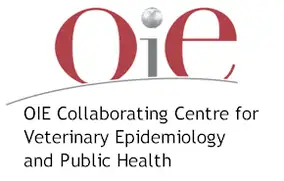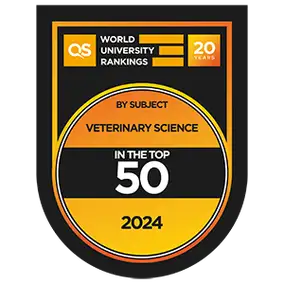Type of qualification
Level of study
Once you’ve graduated with a bachelor’s degree – or have equal experience – you can study at the postgraduate level. Doctoral qualifications require additional entry requirements.
Our courses follow the New Zealand Qualification Framework (NZQF) levels.
Time to complete
International students
International students are not New Zealand citizens or residents.
Study a Master of Veterinary Studies – MVS
Massey’s Master of Veterinary Studies (MVS) is an internationally recognised degree, most suitable for those who would like to undertake a combination of taught courses and a research project. The qualification can be built around your area of interest. For example, you could choose to specialise in epidemiology or public health, or you can develop your expertise across other areas of veterinary science by choosing a MVS without a specialisation. There are a wide range of taught courses for you to choose from, depending on your area of interest and the specialisation that you choose.
Wide range of facilities
Massey University hosts the only veterinary school in New Zealand. Its well-equipped facilities include the Wildbase wildlife hospital, an equine hospital, 24-hour pet hospital and sheep, beef, dairy and deer farms, all located near campus.
Our courses are led by internationally recognised lecturers and have a reputation for their use of real-life case studies and high staff to student ratios. Our staff cover a wide range of veterinary disciplines and collaborate on research projects with other related disciplines including animal production, physiology and nutrition.
Research flexibility
You can choose from two different levels of research for this degree. You can complete a 60-credit research report, or if you would like to complete more in-depth research, you can undertake a 120 credit thesis.
If you have a specific area of research in mind, we advise you to contact the School of Veterinary Science Postgraduate Office through the Get advice button on this page to discuss.
Other postgraduate veterinary programmes
If you want to improve your knowledge in aspects of veterinary science but are unsure about doing research, then you could consider a Postgraduate Diploma in Veterinary Science.
If you are interested in studying via distance then our Master of Veterinary Medicine may be suitable (there are entry restrictions to this programme).
A MVS is a good fit if you:
- are a veterinarian keen on professional development
- want to develop practical skills in non-clinical areas
- are looking to start the process of becoming a veterinary specialist in a non-clinical field.
Entry requirements
Admission to Massey
All students must meet university entrance requirements to be admitted to the University.
Specific requirements
To enter the Master of Veterinary Studies you will have been awarded or qualified for a Bachelor of Veterinary Science, with at least a B grade average, or equivalent.
The Advanced Veterinary Practice specialisation has an additional requirement. You will:
- have been awarded or qualified for a Bachelor of Veterinary Science with at least a B grade average, or equivalent; and
- be selected into the qualification on the basis of an interview.
You will need to provide copies of all official academic transcripts for studies taken at all universities other than Massey University.
English language requirements
To study this qualification you must meet Massey University's English language standards.
Time limits for Honours, Distinction and Merit
Where your qualification is completed within the stated time limit and to a high standard, you may be able to graduate with Distinction or Merit.
- Look for information under ‘Student Progression’ in the General Regulations for Postgraduate Degrees, Postgraduate Diplomas and Postgraduate Certificates.
- Contact us through the Get advice button on this page if you have any questions.
Prior learning, credit and exemptions
For information on prior learning, exemptions and transfer of credit or other questions:
- review the Recognition of Prior Learning regulations
- contact us through the Get advice button on this page.
English language skills
If you need help with your English language skills before you start university, see our English for Academic Purposes (EAP) courses.
Maximum time limits for completion
There are maximum time limits to complete postgraduate qualifications. If you do not complete within the maximum time, you may be required to re-apply for the qualification if you wish to continue your studies.
Official regulations
To understand what you need to study and must complete to graduate read the official rules and regulations for this qualification.
You should read these together with all other relevant Statutes and Regulations of the University including the General Regulations for Postgraduate Degrees, Postgraduate Diplomas, and Postgraduate Certificates.
Returning students
For returning students, there may be changes to the majors and minors available and the courses you need to take. Go to the section called ‘Transitional Provisions’ in the Regulations to find out more.
In some cases the qualification or specialisation you enrolled in may no longer be taking new enrolments, so may not appear on these web pages. To find information on the regulations for these qualifications go to the Massey University Calendar.
Please contact us through the Get advice button on this page if you have any questions.
Structure of the Master of Veterinary Studies
If you study full-time, you’ll take 120 credits per year or 60 credits per semester.
The Master of Veterinary Studies is a parts-based qualification. That means you must complete the first part, before moving to the second.
The first part gives you good knowledge and skills that will help you with the research part of your qualification.
To be able to progress to Part Two of the Master of Veterinary Studies, a B grade average is needed over the Part One courses.
Courses and specialisations
Key terms
- Courses
- Each qualification has its own specific set of courses. Some universities call these papers. You enrol in courses after you get accepted into Massey.
- Course code
- Each course is numbered using 6 digits. The fourth number shows the level of the course. For example, in course 219206, the fourth number is a 2, so it is a 200-level course (usually studied in the second year of full-time study).
- Credits
- Each course is worth a number of credits. You combine courses (credits) to meet the total number of credits needed for your qualification.
- Specialisations
- Some qualifications let you choose what subject you'd like to specialise in. Your major or endorsement is what you will take the majority of your courses in.
Credit summary
180 credits
- Part One courses – 60 or 120 credits
- Part Two thesis or research report – 60 or 120 credits
This is a parts-based qualification. This means there are regulations around your completion of Part One before progressing to Part Two, etc.
Course planning key
- Prerequisites
- Courses that need to be completed before moving onto a course at the next level. For example, a lot of 200-level courses have 100-level prerequisite courses.
- Corequisites
- Courses that must be completed at the same time as another course are known as corequisite courses.
- Restrictions
- Some courses are restricted against each other because their content is similar. This means you can only choose one of the offered courses to study and credit to your qualification.
Part One (Choose at least 60 credits from)
Elective courses
700-level courses selected from the 117, 118, 194 course prefix series
Subjects
Some qualifications let you choose what subject you'd like to specialise in. Your major or endorsement is what you will take the majority of your courses in.
This qualification is available without a specialisation.
Without Specialisation
Develop expertise in a specific area of veterinary science to progress your professional development.
Part Two
Either 120 credits
Course code: 118897 Thesis 120 Credit Part 1 60 credits
A supervised and guided independent study resulting in a published work.
View full course detailsCourse code: 118898 Thesis 120 Credit Part 2 60 credits
A supervised and guided independent study resulting in a published work.
View full course detailsCourse code: 118899 Thesis 120 credits
A supervised and guided independent study resulting in a published work.
View full course detailsOr 60 credits
Course code: 118811 Research Report 60 credits
A detailed examination of a specific topic within the field of study of the candidate, approved by the Chief Supervisor in advance, which may include aspects of original research, problem investigation, and/or study of pre-existing data or published literature.
View full course detailsFees and scholarships
Fees, student loans and free fees scheme
Your tuition fees may be different depending on the courses you choose. Your exact fees will show once you have chosen your courses.
There will also be some compulsory non-tuition fees and for some courses, there may also be charges for things such as study resources, software, trips and contact workshops.
- Get an estimate of the tuition fees for your qualification
- View a list of non-tuition fees that may be payable
Already know which courses you're going to choose?
You can view fees for the courses that make up your qualification on the course details pages.
Student loans (StudyLink) and Fees Free scheme
You may be eligible for a student loan to help towards paying your fees.
The New Zealand Government offers fees-free tertiary study for eligible domestic students. Find out more about the scheme and your eligibility on the Fees Free website. To use the site's eligibility checking tool, you will need your National Student Number.
Current and returning Massey students can find their National Student Number in the student portal.
- Student loans (StudyLink)
- Fees Free
- Student portal
Scholarship and award opportunities
- Allan and Grace Kay Overseas Scholarship
- Graham Chalmers Allen Memorial Scholarship in Veterinary Science
- Joan Berry Fellowships in Veterinary Science - Postgraduate
- Massey University Postgraduate Overseas Research Grant
- Muriel Caddie Scholarship in Vet Science
- Rongotea Lions Club Student Assistance Fund
- Sinclair Cummings Veterinary and Animal Sciences Scholarship
Fees disclaimer
This information is for estimation purposes only. Actual fees payable will be finalised on confirmation of enrolment. Unless otherwise stated, all fees shown are quoted in New Zealand dollars and include Goods and Services Tax, if any. Before relying on any information on these pages you should also read the University's Disclaimer Notice.
Careers and job opportunities
Graduates of this qualification have gone on to become world leaders in veterinary epidemiology and veterinary public health.
Earn more
A 2017 Ministry of Education publication, The post-study earnings and destinations of young domestic graduates, found that in New Zealand:
- young master’s graduates earn more than one and a half times more than the national median (five years after study)
- earnings and employment rates increase with the level of qualification completed
- five years after completion, the median earnings of young master’s graduates are 15% higher than for those with a bachelor’s degree.
Accreditations and rankings

OIE Collaborating Centre for Veterinary Epidemiology and Public Health
Massey's EpiCentre along with mEpiLab and China Animal Health and Epidemiology Center (CAHEC) are recognised by the World Assembly of the World Organisation for Animal Health (OIE) as a Collaborating Centre for Veterinary Epidemiology and Public Health.

QS Ranking - Veterinary Science
The Veterinary School is ranked by QS (Quacquarelli Symonds) as 21st in the world for veterinary science, the highest ranked school in the southern hemisphere.
Useful planning information

Key information for students
Compare qualifications and academic information across different New Zealand institutions. Learn more on careers.govt.nz
